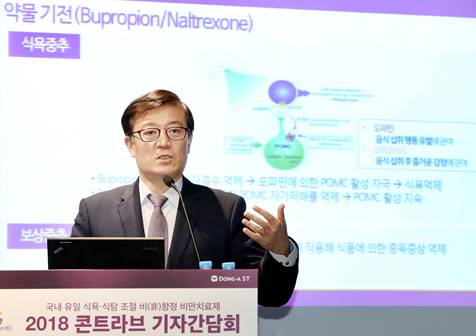Dong-A ST said Contrave, the company’s weight loss pill, has sharply enhanced convenience, holding a news conference at the Koreana Hotel in downtown Seoul Wednesday.
Contrave is a prescription-only, FDA-approved, weight-loss pill believed to work on two areas of the brain — the hunger center and the reward system -- to reduce hunger and help control cravings. The drug combines two medicines, bupropion, a medication for depression and smoking cessation, and naltrexone, alcohol, and opioid dependence treatment.
Regarding safety and efficacy, the company conducted 56-week clinical trials in three phases on 4,031 patients. As a result, patients who take the medication lose approximately two to four times more weight than the placebo group, it said.

“Contrave is an obesity treatment that has a differentiated mechanism of suppressing both appetite and craving,” said Professor Kang Jae-hun, of the family medicine department at Inje University Seoul Paik Hospital. “The drug has also demonstrated significant weight loss and waist circumference reduction through large-scale clinical studies.”
As the dose increased, more patients witnessed a loss of more than 5 percent of their total weight, Kang added.
The drug, which made its debut in the Korean market in June 2016, is jointly sold by Donga-ST and Kwangdong Pharmaceuticals after the two companies signed a joint marketing contract last year.
However, the Ministry of Food and Drug Safety imposed an administrative penalty on Kwangdong Pharmaceutical for illegally advertising Contrave, in December. The ministry imposed a 35.1 million won ($32,292) fine on the drugmaker for exaggerated advertisements of pharmaceutical products.
According to the Korea Centers for Disease Control and Prevention (KCDC), obesity has been steadily increasing in Korea since 2005. A national health survey, conducted by the KCDC last year, showed the obesity rate rising for both men and women. Korea’s obesity treatment market is estimated to be about 90 billion won.

